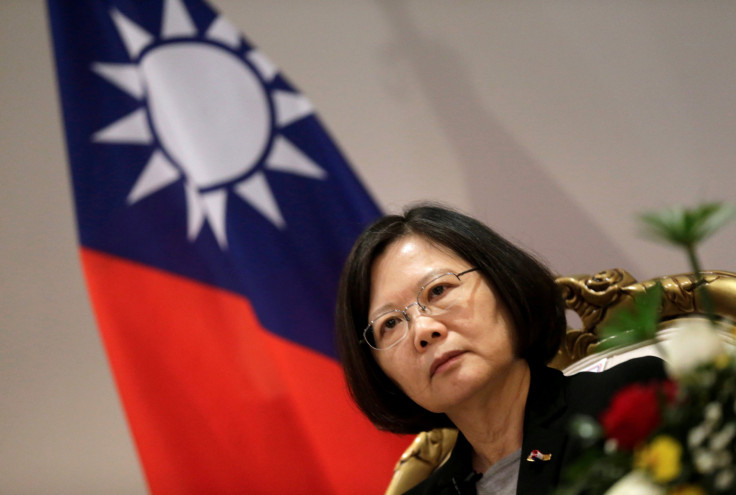Did Trump Start A War With China? Taiwan Controversy Explained; Trump Aides Downplay Diplomatic Faux Pas

UPDATE: 7 p.m. EST — President-elect Donald Trump unleashed a Tweetstorm Sunday, criticizing China, a move certain to exacerbate Beijing’s diplomatic pique engendered by Trump’s telephone conversation last week with the president of Taiwan.
Trump took issue with the formal protest lodged by China.
He also attacked China’s moves in the South China sea.
Original story
Donald Trump’s cadre of spokespeople tried Sunday to downplay the president-elect’s diplomatic faux pas in accepting a congratulatory phone call from the president of Taiwan, emphasizing it was a courtesy call, not a major change in U.S. policy toward China.
Chinese Foreign Ministry spokesman Geng Shuang said Saturday China had lodged a formal complaint over the call between Trump and Taiwanese leader Tsai Ing-wen, the state-run Chinese news agency Xinhua reported.
The 10-minute call was the first conversation between a U.S. president or president-elect with the president of Taiwan in nearly 40 years. Trump earlier had talked with Chinese President Xi Jinping.
"It must be stated that, there is only one China and Taiwan is an inalienable part of China's territory, and the government of the People's Republic of China is the sole legitimate government that represents China. Those are all facts recognized by the international community," Geng said, calling the one-China policy the foundation of U.S.-China relations.
"We urge relevant U.S. side to honor the commitment to the one-China policy as well as the three Sino-U.S. joint communiques, and cautiously and properly handle Taiwan-related issues to avoid any unnecessary disturbance to the bigger picture of the Sino-U.S. relations," he added.
Taiwan declared its independence from the mainland in 1949, but China considers the island a rogue province.
Top Trump aide Kellyanne Conway said on several of the Sunday morning talk shows that it was “just a phone call” and Trump is “well aware” of U.S. policy toward China.
“People shouldn’t read too much into it,” she said on “Fox News Sunday.”
Vice President-elect Mike Pence said it was just a “courtesy call.”
“It's a little mystifying to me that President Obama can reach out to a murdering dictator in Cuba in the last year and be hailed as a hero for doing it and President-elect Donald Trump takes a courtesy call from a democratically elected leader in Taiwan and it’s become something of a controversy,” he said on ABC’s “This Week” in reference to Obama’s efforts to normalize relations with Cuba.
Trump Chief-of-Staff Reince Priebus also downplayed the significance on CBS’s “Face the Nation.”
Much of Trump’s campaign rhetoric was devoted to bashing U.S. trade relations with China, saying the United States has gotten a raw deal and pledging to turn that around, suggesting high tariffs should be reimposed. He also has suggested China be labeled a currency manipulator and threatened to bring trade cases against Beijing before the World Trade Organization.
Cato Institute scholar Scott Lincicome argued in the Federalist every one of Trump’s beliefs about international trade and its impact on U.S. jobs is wrong. Though Trump blames Chinese manufacturing for a loss of U.S. factory jobs, Lincicome argues those jobs have been lost to robots and computers — and they won’t come back, no matter how high the tariffs — which Congress would have to approve. He also noted imposing tariffs would be a violation of WTO rules, giving China a case against the U.S., and hurt U.S. exports to China, the country’s third-largest market.
As far as the yuan goes, Lincicome noted the Chinese actually are trying to keep their currency from falling, not rising, as Trump has charged.
© Copyright IBTimes 2024. All rights reserved.





















